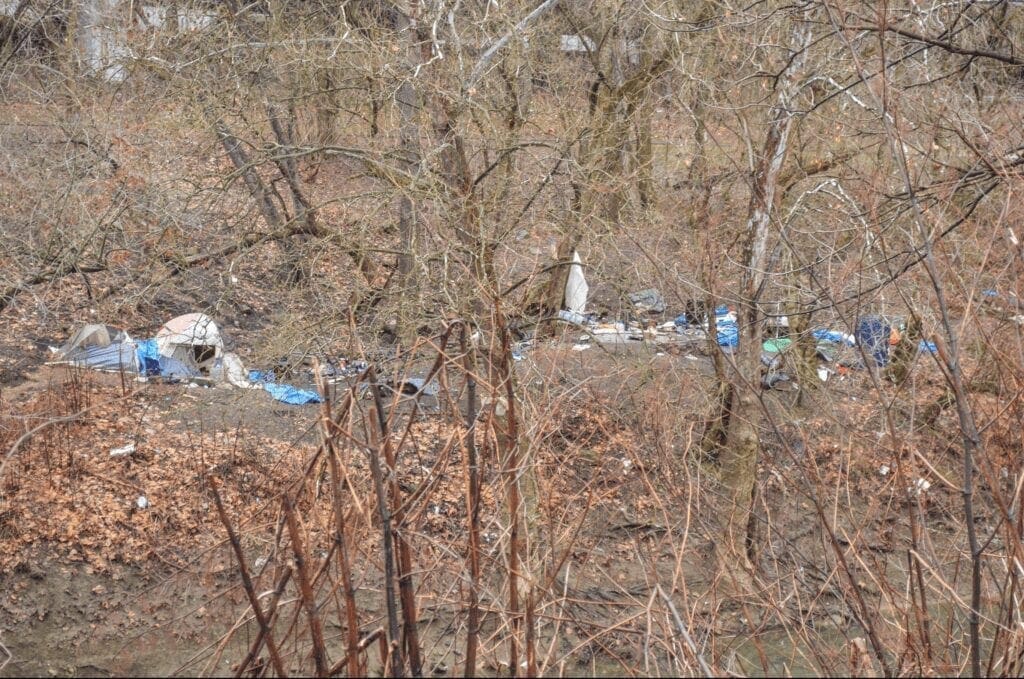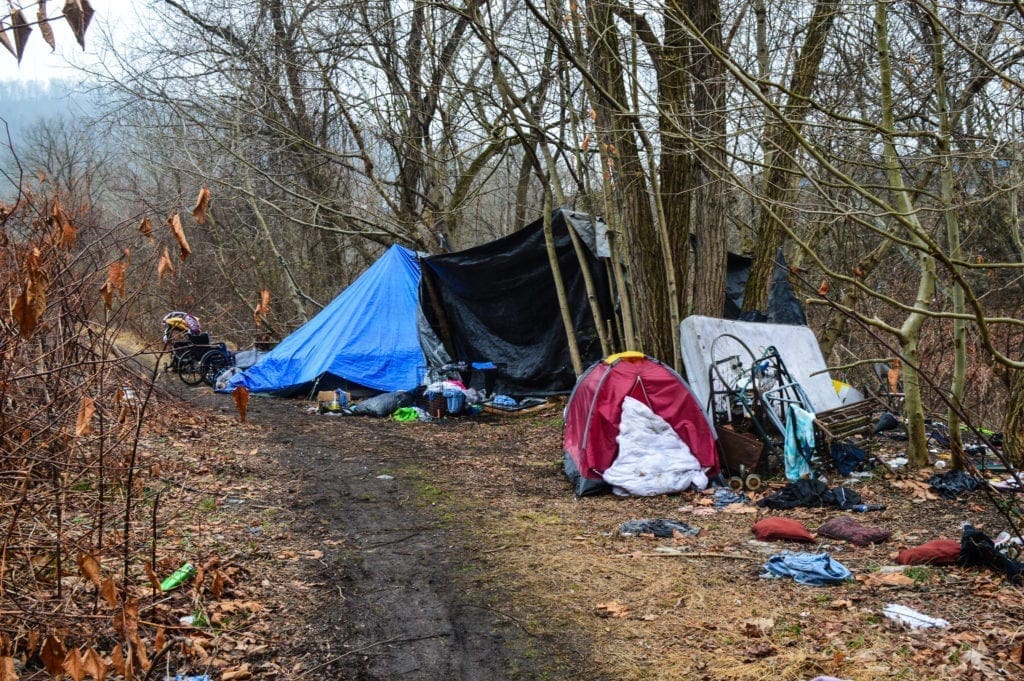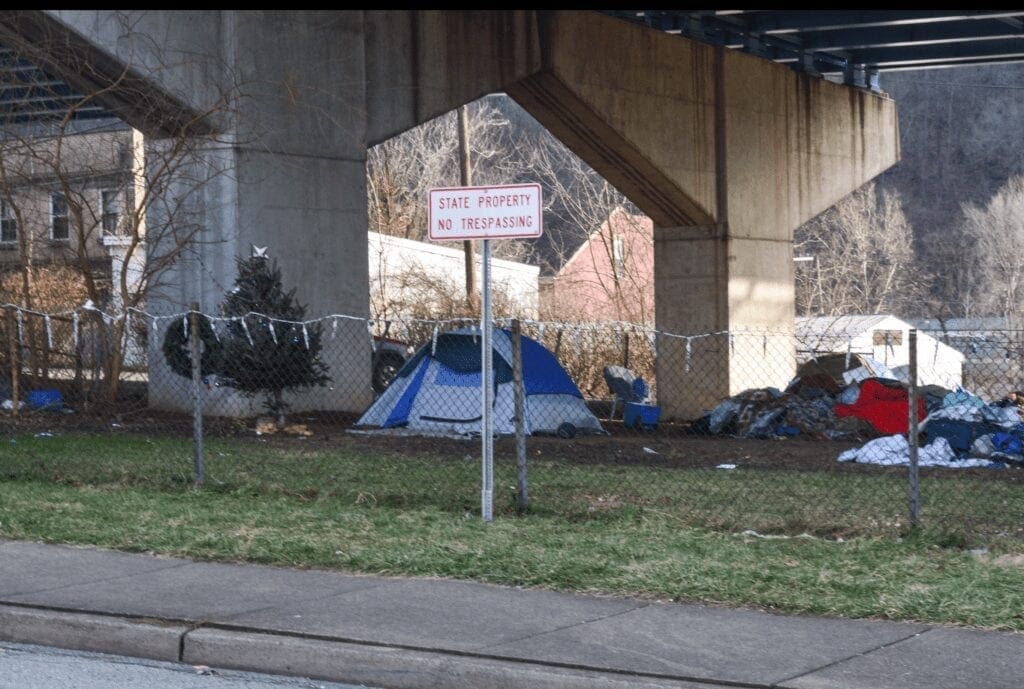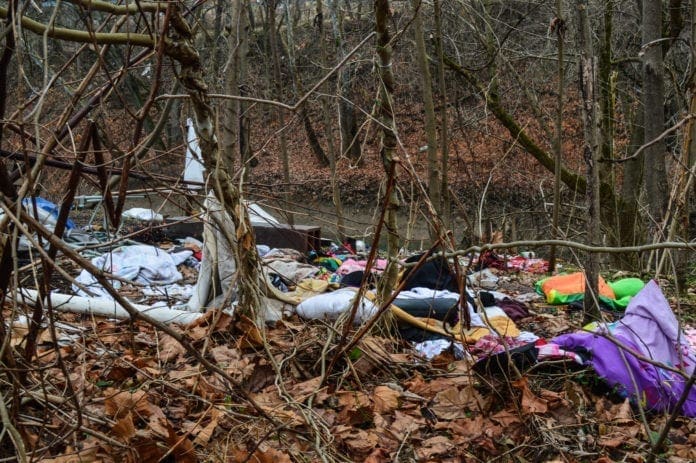The director of Wheeling’s Public Works Department has never seen the level of homelessness that is now present in the city, and he supports the idea of centralizing the encampments in one location.
Rusty Jebbia has been employed by the city of Wheeling for more than 40 years, and never has he had to assign any of his employees to a homeless camp cleanup.
“I don’t remember this going on even 10 years ago,” he reported. “It seems as if it has just popped up more recently, and I’m not sure why. I have been in this position for a few years, and I have no memories of seeing tents out in the woods along the creek unless it was a couple of kids night fishing. We once had a couple of people living under one of the bridges, but that’s it. That’s all I recall.

“But we’ve not anything like this before, and I know my guys had never cleaned up an entire homeless encampment, let alone several of them like we have the past couple of years,”Jebbia said. “Now, we have had some people in the downtown, but they were seasonal. They seemed to come here when it warmed up, but when it got colder, my guess is that they would make their way south.”
Last year alone, Jebbia guided the clearing of a plethora of homeless camps located along Big Wheeling Creek. One encampment had caught fire that had to be extinguished by Wheeling firefighters and then cleared by city employees.
“I have no idea how we got to this level, but something has to be done because it’s an eyesore, and it’s a safety and health issue for people, so it really does need to be corrected in some way,” Jebbia said. “It’s one of things that I hear about the most from the people who live here.”

Camp Clean-Up
In September 2020, a few encampments were cleaned by the city because some inhabitants were found to be participating in criminal activity. According to Wheeling Police Chief Shawn Schwertfeger at the time, officials with Swank Construction had reported several of their vehicles had been broken into and ransacked.
The Swank employees also reported missing equipment, and those items were later found near encampments. Schwertfeger also reported last year one large encampment near Wetzel Street had been bobby trapped with boards with rusty nails.
But when it comes to cleaning, Jebbia has instructed his employees not to touch anything with their own hands.
“I haven’t heard that we need to clean up any camps yet this spring, and to me, that’s a very good thing because it’s not a pleasant experience for anyone involved,” Jebbia said. “It is a problem for us to clean them up because it takes up so much manpower and time. We have to take people away from what they should be doing to go clean these places up.
“Normally, the trash that we have to clean up has been thrown over the creek bank, and that makes it very difficult to get it,” he said. “And I have told the guys to use as much of our equipment as they can so they don’t have to touch anything. That’s because you don’t know what you’re going to get into.”
Two items, however, are expected on each occasion.
“When our guys clean these places up, the number one thing they watch out for are the needles,” Jebbia said. “I’ve told them to use shovels to pick those things up because you never know what it was used for before being tossed away.
“And then there are the buckets with human waste that get dumped out,” he explained. “They just dump buckets of waste all over the place, and that’s another thing we don’t need to be involved with. It’s really disgusting.”

A Centralized Location
Wheeling Councilman Ben Seidler (Ward 2) told LEDE News last week an ongoing conversation now is taking place among city officials about creating an area for the homeless people who come to Wheeling to take advantage of organizations like the Greater Wheeling Soup Kitchen and Catholic Charities Neighborhood Center.
The location of the area, according to Seidler, has yet to be determined, but it is an idea Jebbia supports for several reasons.
“I believe centralizing all the camping would be a good direction to go in because that way we wouldn’t have to go to so many different places all of the time,” the public director said. “Most of the locations where they are now are pretty isolated and not easy to get to. We have a tough time getting our equipment into these areas unless they are along the trails.
“But if it is centralized, then maybe they would police themselves, take better care of their trash, and porta-johns would be a great idea,” Jebbia said. “Plus, having them all together would prevent all of the litter that ends up in Wheeling Creek and ultimately the Ohio River.”
Plus, his crews could concentrate on their normal duties instead of being placed in danger during a workday.
“When we have to go clean these camps up, it’s very frustrating to me because we have so many other things that we have to get accomplished,” Jebbia explained. “Especially now with the warmer weather, we have a lot of jobs on the list, but when we get a cleanup to do, it’s sets us back. That’s really frustrating.
“There have been different organizations that have helped out, and many times they will leave the trash bags there for us to pick up, and we appreciate that,” he added. “It still takes time away from the things we should be doing, but when those organizations do that, it takes less time away.”


